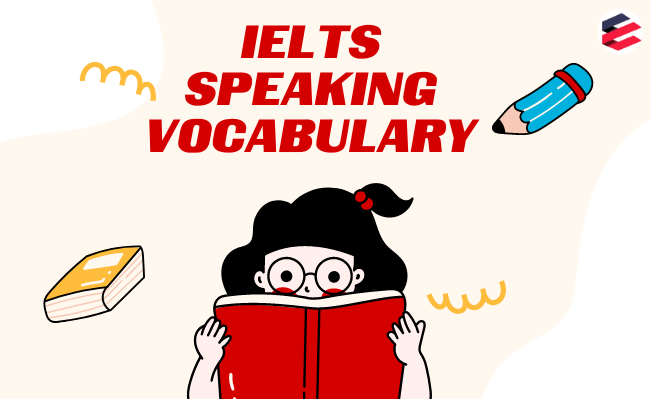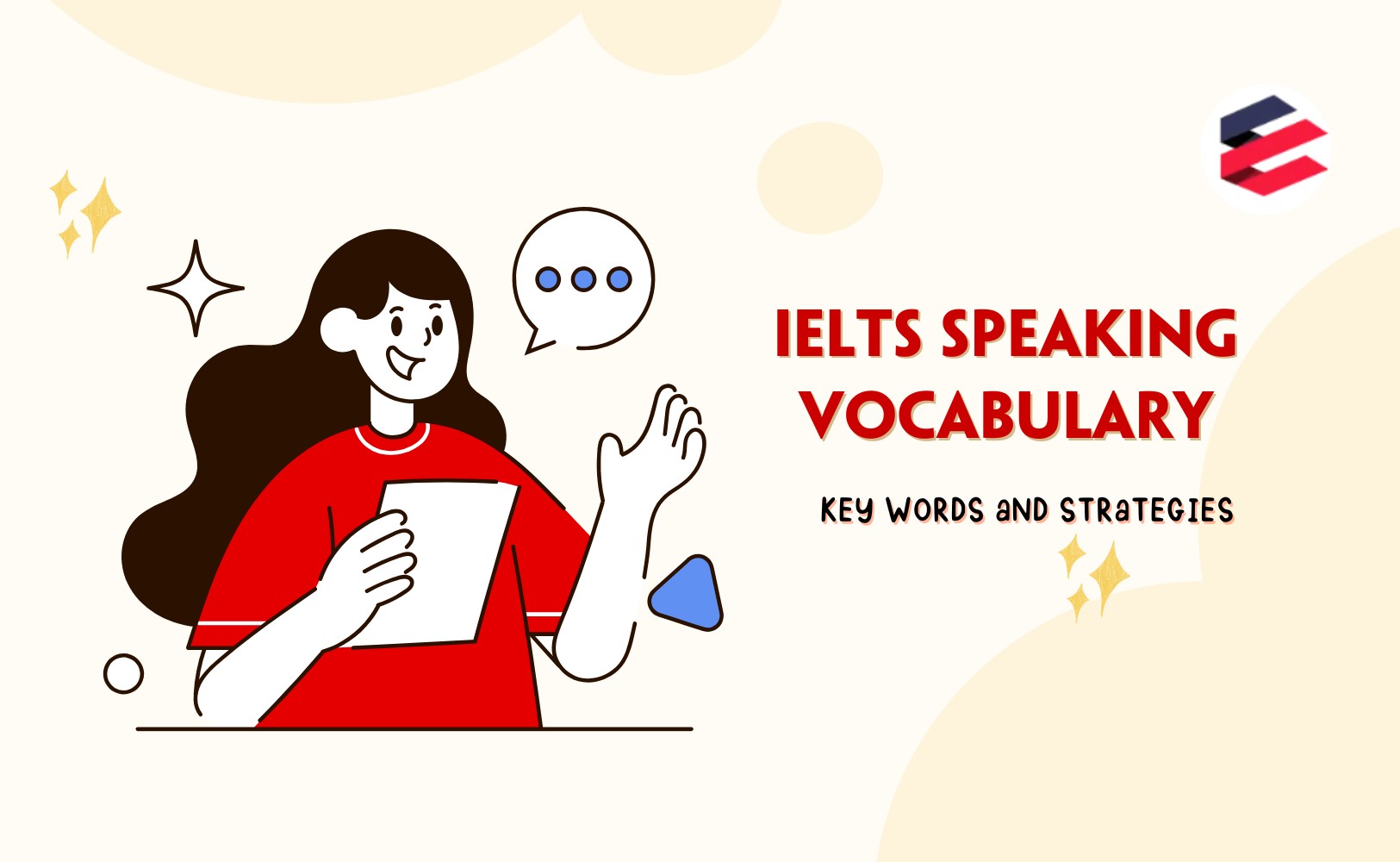Enhancing Performance through IELTS Speaking Vocabulary Enrichment
In the IELTS exam, Lexical Resource accounts for 25% of your total Speaking score. It is not just about knowing “big words”; it is about using the right words naturally and precisely.
At IELTS-Testpro, we often see candidates struggling not because they lack ideas, but because they lack the IELTS speaking vocabulary to express those ideas effectively. This comprehensive guide will transform your passive vocabulary into active, high-scoring language.

I. The 3 Pillars of IELTS Speaking Vocabulary
To achieve a Band 7.0+, your vocabulary must be balanced. We categorize essential vocabulary into three distinct tiers:
1. Basic Vocabulary (The Foundation)
These are the fundamental words for everyday communication. While necessary for Part 1, relying solely on them limits your score to Band 5.0-6.0.
2. Topic-Specific Vocabulary ( The Core)
This is where you demonstrate range. If the topic is “Environment,” you shouldn’t just say “bad weather”; you should use terms like “environmental degradation” or “carbon footprint”.
IELTS-Testpro Tip: Grouping words by theme (as shown in Section 4) is the fastest way to memorize them.
3. Advanced Vocabulary (The Booster)
This involves idiomatic expressions and sophisticated terminology. However, use these with caution—accuracy is more important than complexity.
II. Common Vocabulary Mistakes to Avoid
Before we dive into the lists, let’s address the pitfalls that IELTS-Testpro examiners frequently encounter:
- The “Thesaurus” Trap (Overusing Synonyms): Don’t just swap “happy” for “elated” if the context isn’t right. Misusing complex words lowers your score.
- Repetition (The “Very” Problem): Overusing “very” (e.g., very good, very bad) sounds mechanical. Instead of “very big,” use “massive” or “colossal”.
- Forcing Idioms: Using idioms like “it’s raining cats and dogs” (which is outdated) can sound unnatural. Aim for natural collocations.

III. Functional Vocabulary: Structure Your Answers
This section covers “signposting language”—the glue that holds your speech together. These phrases improve your Fluency and Coherence score.
Opening & Organizing
| Function | Band 6.0+ Phrases | Band 7.0+ Phrases |
|---|---|---|
| Introduction | “To begin with…” | “Let me start by stating that…” |
| Sequencing | “Firstly… Next…” | “The primary factor is… Subsequently…” |
| Examples | “For example…” | “To illustrate this point…” |
Expressing Opinions & Analysis
| Function | Phrase |
|---|---|
| Personal Opinion | “As far as I’m concerned…” / “From my perspective…” |
| Uncertainty | “I can’t say with absolute certainty, but…” / “It’s hard to predict, however…” |
| Agreement | “That is a valid argument…” / “I align with that view…” |
| Disagreement | “I have a slightly different view…” / “I’m not entirely convinced by that…” |
Describing Changes & Trends (Crucial for Part 3)
- “The situation has undergone a complete transformation…”
- “There has been a significant shift towards…”
- “The trend seems to be moving away from X and towards Y…”
IV. IELTS Speaking vocabulary
At IELTS-Testpro, we have curated the most common topics for 2025. Master these collocations to sound like a native speaker.

1. Family & Relationships
- Core Terms:
- Nuclear family (Parents and children)
- Extended family (Aunts, uncles, grandparents)
- Sibling rivalry (Competition between brothers/sisters)
- Upbringing (The way a child is raised)
- Adolescence (The period following the onset of puberty)
- Spouse (Husband or wife)
- Advanced Collocations & Idioms:
- “A close-knit family” (A family with very good relationships and support).
- “Generation gap” (Differences in attitudes between people of different ages).
- “Family dynamics” (The patterns of interactions among family members).
- “Flesh and blood” (Someone who is part of your family).
- “Run in the family” (A common feature/trait in a family).
- “To see eye to eye” (To agree with someone).
2. Education & Learning
- Core Terms:
- Curriculum (Subjects comprising a course of study)
- Pedagogy (The method and practice of teaching)
- E-learning (Learning conducted via electronic media)
- Literacy (The ability to read and write)
- Alumnus (A graduate or former student)
- Discipline (A branch of knowledge)
- Advanced Collocations & Idioms:
- “Foster critical thinking” (Encourage deep, analytical thought).
- “Pursue higher education” (Go to university/college).
- “Lifelong learning” (Continual self-improvement throughout life).
- “Rote learning” (Memorization technique based on repetition).
- “To hit the books” (To study hard).
- “With flying colors” (To pass an exam with a very high score).
3. Travel & Tourism
- Core Terms:
- Itinerary (A planned route or journey)
- Cuisine (A style or method of cooking)
- Eco-tourism (Tourism directed toward exotic natural environments)
- Accommodation (A room, group of rooms, or building in which someone may live or stay)
- Landmark (An object or feature of a landscape or town that is easily seen and recognized)
- Souvenir (A thing that is kept as a reminder of a person, place, or event)
- Advanced Collocations & Idioms:
- “Experience cultural immersion” (Deeply engaging with a new culture).
- “Wanderlust” (A strong desire to travel).
- “Off the beaten track” (Places not visited by many tourists).
- “Hustle and bustle” (Busy and noisy activity).
- “Travel on a shoestring” (Traveling with very little money).
- “To catch the red-eye” (To take a late-night flight).
4. Work & Careers
- Core Terms:
- Entrepreneurship (Setting up a business)
- Job satisfaction (Feeling fulfilled by one’s job)
- Networking ( interacting with others to exchange information and develop professional contacts)
- Prospects (Chances or opportunities for success)
- Redundancy (The state of being no longer needed or useful)
- Vacancy (An unoccupied position or job)
- Advanced Collocations & Idioms:
- “Climb the career ladder” (To get promoted to higher positions).
- “Achieve a work-life balance” (Managing job obligations and personal life).
- “Professional development” (Learning new skills for career growth).
- “Dead-end job” (A job with no promotional opportunities).
- “Nine-to-five job” (A job with normal daytime hours).
- “To think outside the box” (To think creatively/unconventionally).
5. Environment & Sustainability
- Core Terms: * Biodiversity (The variety of life in the world)
- Conservation (Preservation, protection, or restoration of the natural environment)
- Renewable energy (Energy from a source that is not depleted when used)
- Habitat (The natural home or environment of an animal, plant, or other organism)
- Ecosystem (A biological community of interacting organisms)
- Contamination (The action or state of making or being made impure)
- Advanced Collocations & Idioms:
- “Reduce our carbon footprint” (Lower impact on the environment).
- “Eco-friendly practices” (Habits that do not harm the nature).
- “Mitigate climate change” (Reduce the severity/effects of global warming).
- “Sustainable development” (Economic development without depletion of natural resources).
- “Endangered species” (A species of animal or plant that is seriously at risk of extinction).
- “The tip of the iceberg” (Only a small part of a much larger problem).
6. Technology
- Core Terms:
- Automation (The use of largely automatic equipment in a system)
- Cybersecurity (Protection of computer systems)
- Virtual Reality (VR) (Computer-generated simulation)
- Artificial Intelligence (AI) (Computer systems able to perform tasks aimed at human intelligence)
- Innovation (A new method, idea, product, etc.)
- Gadget (A small mechanical or electronic device or tool)
- Advanced Collocations & Idioms:
- “Cutting-edge technology” (The most advanced stage of development).
- “Tech-savvy” (Well informed about or proficient in the use of modern technology).
- “The digital revolution” (The shift from mechanical to digital electronics).
- “Obsolete technology” (Technology that is no longer produced or used; out of date).
- “Glued to the screen” (Looking at a device for a long time).
- “Not rocket science” (Not difficult to understand).
7. Hobbies & Leisure
- Core Terms:
- Pastime (An activity that someone does regularly for enjoyment)
- Recreational activities (Things done for enjoyment when one is not working)
- Unwind (Relax after a period of work or tension)
- Passion (Strong and barely controllable emotion/interest)
- Leisure (Free time)
- Pursuit (An activity of a specified kind, especially a recreational or sporting one)
- Advanced Collocations & Idioms:
- “A creative outlet” (A way to express one’s creativity).
- “Engage in outdoor pursuits” (Participate in outdoor sports/activities).
- “Let my hair down” (Relax and enjoy oneself – Idiom).
- “Take up a new hobby” (Start doing a new activity).
- “Have a go at something” (Try something new).
- “Variety is the spice of life” (New and different experiences make life more interesting).
V. Expert Strategy: How to Learn Vocabulary
Don’t just memorize lists. Follow the IELTS-Testpro Method to retain what you learn:
- Contextualize: Never learn a word alone. Always learn it in a sentence.
- Active Recall: Use the new word in a Part 2 practice answer immediately after learning it.
- Record Yourself: Listen to your pronunciation. Are you saying “scheme” or “schedule” correctly?
To truly master these lexical resources, passive learning is not enough. You must actively apply them in a simulated environment. We strongly recommend taking a full IELTS speaking practice test at IELTS-Testpro to gauge your current level, identify gaps in your word usage, and refine your fluency before the real exam.
In summary, building a strong IELTS speaking vocabulary is a journey of quality over quantity. By consistently using the collocations and strategies outlined in this guide, you will not only impress the examiners but also gain the confidence to express your thoughts with precision and eloquence in any situation.